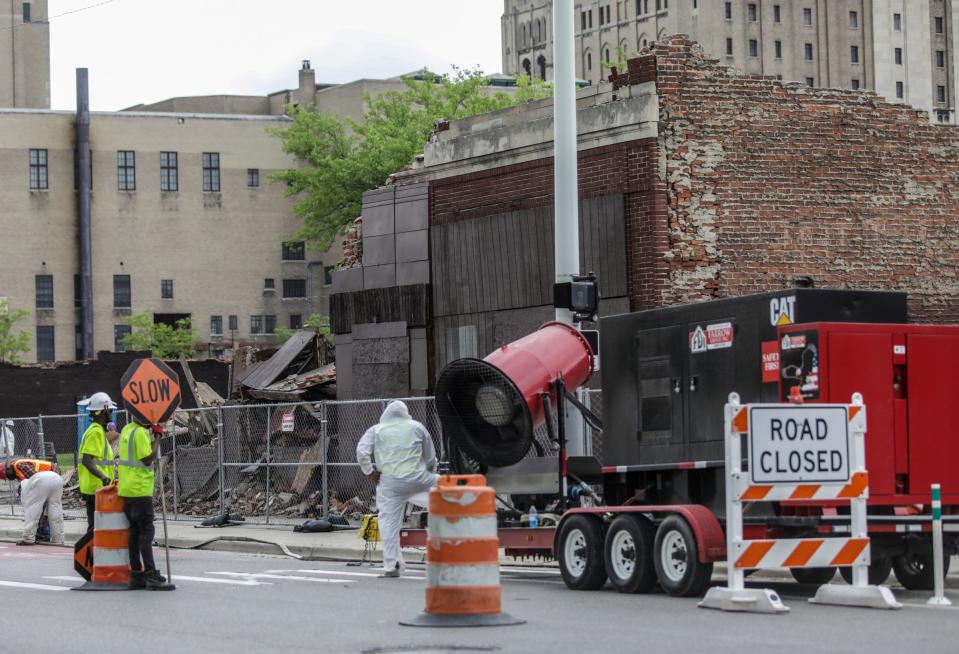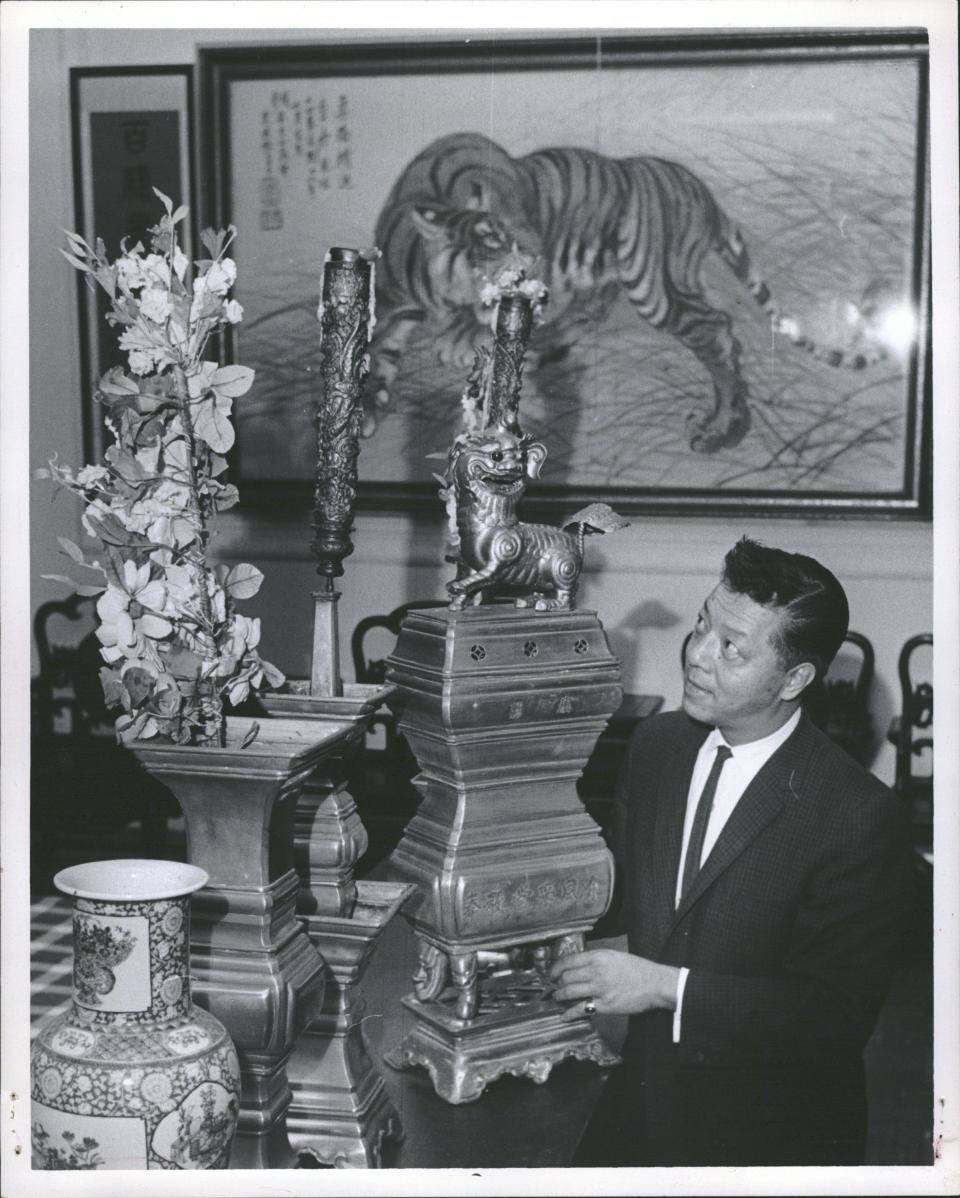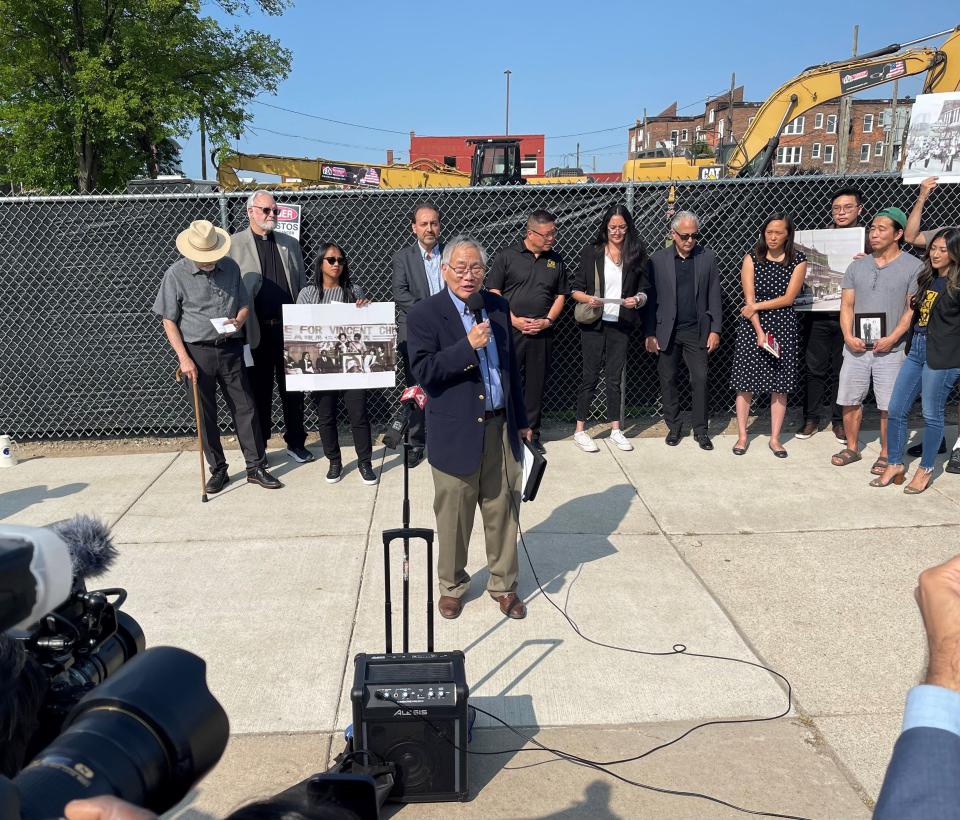Opinion: Ilitches up to old tricks with demolition of historic Detroit Chinatown building
It's hard to argue with a pile of rubble.
Last week, Chinese-American metro Detroiters, historic preservationists and the Detroit City Council thought they'd reached détente with the city's Buildings, Safety Engineering and Environmental Department and Olympia Development of Michigan, the real estate arm of the billionaire Ilitch family: By mutual agreement, demolition of the Olympia-owned building at 3143 Cass Ave. was on hold, pending a historic review after the council returned in September from its summer recess.
But on July 29, without warning, Olympia took the building down.
Why? That's a question the Ilitch family surely will not answer.
The city marked 3143 Cass for demolition in 2018, deeming the structure unsafe. In May of this year, the Ilitches notified the city that demolition was in the works, prompting community members to raise concerns.

Two weeks ago, Councilwoman Gabriela Santiago-Romero, whose district encompasses the site, got involved, proposing a interim historic designation for the site, with the Historic Designation Advisory Board set to research it. On a July 24 call, Santiago-Romero said, representatives of BSEED and Olympia had seemed to defer to council's intention to pause the demolition, and on July 25, the council voted unanimously in favor of the pause, with, members believed, the blessing of both Olympia and Detroit Mayor Mike Duggan's office.
Wednesday, BSEED Director Dan Bell asked the city's Law Department whether council's resolution was binding. City attorney Conrad Mallett said it was not — never the point, Santiago-Romero said, of the good-faith agreement — but still, she said, there was no indication that demolition was imminent.
Now, it's a fait accompli.
The community that was
At a Monday press conference at the demolition site, members of metro Detroit's Chinese-American community stood in front of a hurricane fence with signs warning that asbestos and other chemicals released in the demolition might cause cancer.

Behind the fence, bulldozers shifted steel beams and other debris, and the spray of water intended to tamp down those dangerous chemicals periodically misted the crowd.
It's hard to overstate the historic significance of 3143 Cass. Built in 1883 — one year, speaker Arthur Park noted at the press conference, after the xenophobic Chinese Exclusion Act was passed — the building later became an anchor of Detroit's once-thriving Chinatown (Detroit's second Chinatown; the first, centered around Michigan and Third avenues, was demolished to make way for the John C. Lodge Freeway). The building was home to the Shanghai Café, offering employment to recent immigrants who didn't speak English.
Carolyn Chin, whose family owned the Shanghai Café, spoke of her grandparents' arrival in this country, and the restaurant they opened: "They did what they knew. They cooked."
By 1963, the second floor housed the Chinese Merchants' Association, On Leong Hall, a gathering place for cultural and community events, explained James Lee, also descended from the owners of Shanghai Cafe. The association arbitrated disputes between families and made business loans in Chinatown at a time when Asian-Americans still faced barriers to capital.
After the 1982 murder of Chinese-American Vincent Chin, American Citizens for Justice was founded in that building, said group co-founder Ronald Hwang.
More: Melvindale business faces 59 misdemeanor charges as Detroit cracks down on sign ordinance
More: Asian Americans mourn loss of Chinatown building, ask Ilitches to work with community
But by the 1990s, Detroit's Chinatown had largely emptied, as crime rose and population declined.

“Even when people moved out of the city, this was a gathering place," said Richard Mui of the Association of Chinese Americans. Eventually, even the community center closed.
The Ilitches, through a subsidiary company, purchased 3143 Cass in 2004 for $50,000. When the city slated the building for demolition in 2018, it was in extreme disrepair, the roof caving in, trees growing in the structure.
Let's start there.
Intentional neglect
The Ilitches have owned this building for 19 years. That 3143 Cass became irreparably dilapidated was a choice, and it's one this family — who profit from Little Caesars Arena, own Little Caesars Pizza the Detroit Red Wings and Tigers, and whose members regularly appear on Forbes' list of the richest Americans — has made again and again, with few repercussions.
In 2014, Ilitch Holdings President and CEO Chris Ilitch told the Detroit News that the family spent 15 years purchasing land to build Little Caesars Arena, allowing property to languish, because developing it would have driven up the cost of other parcels the family hoped to acquire.
And let's talk about the Madison-Lenox.
In 2005, the Ilitch family pursued the demolition of the historic hotel with a similar fervor. That time, preservationists gained the upper hand when the city's historic district commission denied repeated Ilitch requests for demolition. The Ilitches were appealing that decision to a state body when the City of Detroit declared the structure unsafe and began an emergency demolition. Although preservationists won an injunction to stop the demo, it was too late — the wrecking crew had already damaged the structure beyond the point of rehabilitation. The punchline, of course, is that droves of buildings like the Madison-Lenox have subsequently been renovated, and charge top dollar for space.
Demolition days are here again?
For a while, it seemed like Detroit's demolition fever was over.
But not for the Ilitches, says Francis Grunow, a lifelong Detroiter, public policy consultant and past chair of the first District Detroit Neighborhood Advisory Council.
"They fundamentally don't operate differently than they ever have," he said. "This is the old way of doing things coming back to haunt all of us."
Could 3143 Cass have been saved in 2004? Could it have been saved this year?
"Within reason, anything is salvageable, if you have will and you have money," Grunow said. "They have half of that."
When historical structures are destroyed, the loss extends beyond the value of a building, James Lee said Monday.
"We don't have an understanding of our past," he said. "We don't have an agreement about what our past was."
A historic designation would have seriously slowed the demolitions process, Santiago-Romero said. And that's probably the point: "If there is no building there, there's no need to have this discussion."
Chin, Lee, Hwang, Mui and other members of metro Detroit's Chinese-American community who gathered Monday asked the Ilitches to remember their ancestors when deciding what happens next at the site.
A plaque, they say, won't be enough.
Nancy Kaffer is the editorial page editor of the Detroit Free Press. Contact: nkaffer@freepress.com. Submit a letter to the editor at freep.com/letters. Become a subscriber at Freep.com.
This article originally appeared on Detroit Free Press: Opinion: Ilitch demolition of Detroit Chinatown building wrong call

